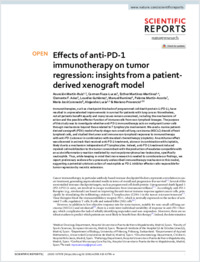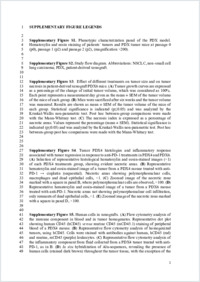Effects of anti-PD-1 immunotherapy on tumor regression: insights from a patient-derived xenograft model
- Martín-Ruiz, Asunción Medical Oncology Department, Hospital Universitario Puerta de Hierro Majadahonda, Madrid, Spain - Faculty of Sports Sciences, European University, Madrid, Spain
- Fiuza-Luces, Carmen Research Institute of the Hospital 12 de Octubre (imas12), Madrid, Spain
- Martínez-Martínez, Esther Medical Oncology Department, Hospital Universitario Puerta de Hierro Majadahonda, Madrid, Spain - Department of Biology, University of Fribourg, Fribourg, Switzerland
- Arias, Clemente F. Departament of Applied Mathematics, Universidad Complutense de Madrid, Madrid, Spain
- Gutiérrez, Lourdes Medical Oncology Department, Hospital Universitario Puerta de Hierro Majadahonda, Madrid, Spain
- Ramírez, Manuel Oncohematology Department, Children’s Hospital Niño Jesús, Madrid, Spain
- Martín-Acosta, Paloma Pathology Department, Hospital Universitario Puerta de Hierro Majadahonda, Madrid, Spain
- Coronado, Maria José Confocal Microscopy Core Facility, Hospital Universitario Puerta de Hierro Majadahonda, Madrid, Spain
- Lucia, Alejandro Faculty of Sports Sciences, European University, Madrid, Spain - Research Institute of the Hospital 12 de Octubre (imas12), Madrid, Spain
- Provencio, Mariano Medical Oncology Department, Hospital Universitario Puerta de Hierro Majadahonda, Madrid, Spain
-
27.04.2020
Published in:
- Scientific Reports. - 2020, vol. 10, no. 1, p. 7078
English
Immunotherapies, such as checkpoint blockade of programmed cell death protein-1 (PD-1), have resulted in unprecedented improvements in survival for patients with lung cancer. Nonetheless, not all patients benefit equally and many issues remain unresolved, including the mechanisms of action and the possible effector function of immune cells from non-lymphoid lineages. The purpose of this study was to investigate whether anti-PD-1 immunotherapy acts on malignant tumor cells through mechanisms beyond those related to T lymphocyte involvement. We used a murine patient-derived xenograft (PDX) model of early-stage non–small cell lung carcinoma (NSCLC) devoid of host lymphoid cells, and studied the tumor and immune non-lymphoid responses to immunotherapy with anti-PD-1 alone or in combination with standard chemotherapy (cisplatin). An antitumor effect was observed in animals that received anti-PD-1 treatment, alone or in combination with cisplatin, likely due to a mechanism independent of T lymphocytes. Indeed, anti-PD-1 treatment induced myeloid cell mobilization to the tumor concomitant with the production of exudates compatible with an acute inflammatory reaction mediated by murine polymorphonuclear leukocytes, specifically neutrophils. Thus, while keeping in mind that more research is needed to corroborate our findings, we report preliminary evidence for a previously undescribed immunotherapy mechanism in this model, suggesting a potential cytotoxic action of neutrophils as PD-1 inhibitor effector cells responsible for tumor regression by necrotic extension.
- Faculty
- Faculté des sciences et de médecine
- Department
- Département de Biologie
- Language
-
- English
- Classification
- Biological sciences
- License
-
License undefined
- Identifiers
-
- RERO DOC 328519
- DOI 10.1038/s41598-020-63796-w
- Persistent URL
- https://folia.unifr.ch/unifr/documents/308586
Other files
Statistics
Document views: 145
File downloads:
- pdf: 226
- Supplementary material: 151

